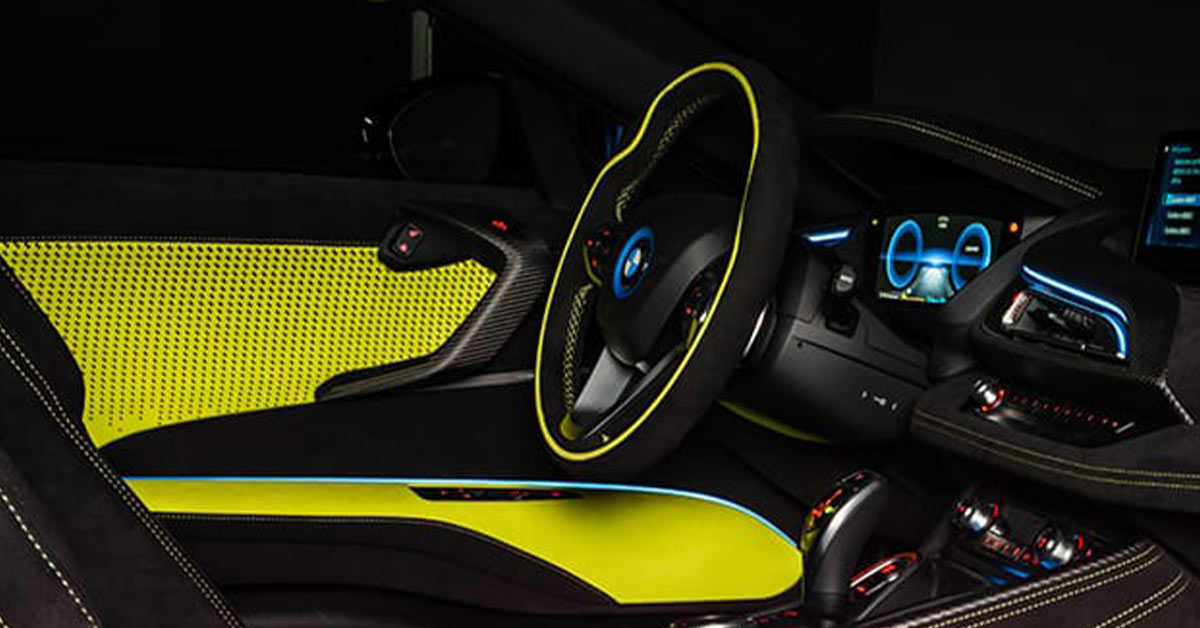
Alcantara vs Leather Steering Wheel: Why Alcantara Fabric Is Better
Alcantara is a unique suede-like fabric that offers a synthetic textile alternative. Alcantara fabric is composed of roughly 68% polyester and 32% polyurethane, which gives the suede-like fabric increased durability and stain resistance. The appearance and tactile feel of the material is similar to that of suede, and it may be erroneously identified as such.
The material was created and developed in the early 1970s by Miyoshi Okamoto, a scientist working for the Japanese chemical company Toray Industries. The development of Alcantara was based on the same technology as another product from the same company named Ultrasuede. In 1972, a joint venture between Italian chemical company ENI and Toray formed Alcantara S.p.A. to manufacture and distribute this unique material.
Alcantara fabric (commonly referred to as Alcantara leather) is commonly used for automotive interiors such as Alcantara seating, dashboard trim and headliners by many high-end automotive manufacturers. Specifically, Alcantara is widely used for steering wheel covers in many performance-focused vehicles. There are many unmatched benefits of using Alcantara for steering wheel covers compared to other materials such as leather. The key benefits are:
1. Alcantara Fabric Is Easy to Clean and Maintain
Alcantara is extremely simple and easy to clean because of its fabric composition. Unlike leather, which is made out of animal skin and contains oil, Alcantara fabric encompasses mostly polyester, which makes this material more resistant to stains. Alcantara’s unique suede-like fabric makes it a terrific material for steering wheel covers because it is less likely to get dirty or stained from greasy or oily fingers, and it is easier to clean using simple cleaning techniques. For example, a simple wipe using a wet towel on a daily or weekly basis will keep your alcantara steering wheel cover in top condition. If there is a stubborn stain on the Alcantara steering wheel cover, you can purchase Alcantara-specific cleaning solutions to treat the stains. If you do not have a specialized cleaning solution, you can use water, lemon juice, or pure ethyl alcohol (found in liquors) and follow the instructions below for different types of stains:
- Stains from fruit juice, jam, jelly, syrup, ketchup: use lukewarm water, rinse by dabbing with clean water.
- Blood, egg, excrement, urine: use cold water: avoid warm water because it makes these substances coagulate. Rinse by dabbing with clean water.
- Stains from liquors, alcoholic beverages, wine, beer, coke, and tea: use lukewarm water. If the colour mark remains, treat it with lemon juice and then rinse it well.
- Stains from indelible pencil, cocoa, chocolate, pastry with cream or chocolate, ice-cream, mustard: use lukewarm water and rinse by dabbing with clean water.
- Stains from vinegar, hair gel, tomato sauce, coffee with sugar: use lemon juice and then wipe with lukewarm water. Rinse by dabbing with clean water.
It’s also important to note that soft bristle brush will help the Alcantara fibres to stand up and not become matted down.
2. Alcantara Fabric Does Not Get Too Hot or Cold
Because Alcantara fabric is made mostly with polyester, it does not retain much heat from the environment. This feature makes Alcantara fabric fantastic material for automotive steering wheel covers because the material does not get hot in the summer. Alcantara fabric does not get too cold either, which means that an Alcantara steering wheel cover will not get too cold in the winter. This is the ultimate perfect steering wheel cover material!
3. Alcantara Fabric Offers a Wide Variety of Colours
At Hydes Leather, we have 45 colours in Alcantara cover and Alcantara panel. Examples of the colours include:
- Java
- Pergament
- Bright natural
- Mushroom
- Amber glow
- Deep back
- Charcoal black
- Signal blue
- Deep blue
- Royal Blue
- Tobago
- Cobalt blue
- Light blue
- Dark brown
- Raw amber
- Sienna
- Rust
- Hazelnut
- Coco/chocolate
This wide array of colours allows you to select the one that best fits your personality or vehicle.
4. Alcantara Fabric Is Not Made from Animals
If you are a strong advocate for animal-free products, Alcantara is an excellent choice for improving your automotive interior. Alcantara is made out of polyester and polyurethane.
5. Alcantara Fabric Remains in Top Condition for an Extended Amount of Time
Because of its unique elements, Alcantara is highly resistant to cracking due to harmful UV rays, compared to leather, which can easily dry out and crack if exposed to the sun for a long period of time. Leather steering wheel covers age and wrinkle significantly if they are not maintained properly.
6. Alcantara Fabric is More Sustainable
Alcantara continues to commit to achieve sustainability. The company’s core value is to find balance between profitability and sustainability. Alcantara S.p.A. allocates over 50% of its global investments to activities and initiatives related to sustainability.
Currently, Alcantara has achieved the astounding goal of being carbon neutral. Carbon neutrality means having a net balance of CO2 emissions equal to zero, both in the production process and the disposal of the product. Alcantara was one of the first companies in the globe to reach this ambitious goal in 2009, obtaining the much-coveted Carbon Neutrality certification from one of the most rigorous international certification bodies, TÜV SÜD. Since then, the company has fostered a deep and constant commitment to sustainability, as underlined by the processes designed to achieve continuous improvement within the company, and the numerous additional certifications it has obtained.
Alcantara fabric measures, reduces, and offsets 100% of all carbon emissions attributable both to corporate activities and to the product, from cradle to grave. The residual emissions which cannot yet be eliminated by current technologies are offset each year through Alcantara's participation in green offsetting projects sponsored by the United Nations. These projects are designed to promote the use of renewable energy in the poorest and most disadvantaged areas of the world.


